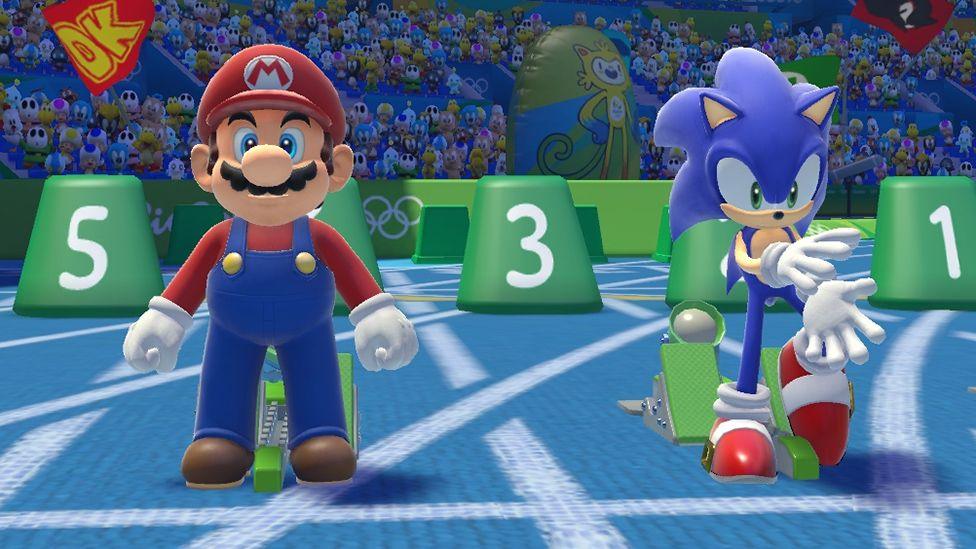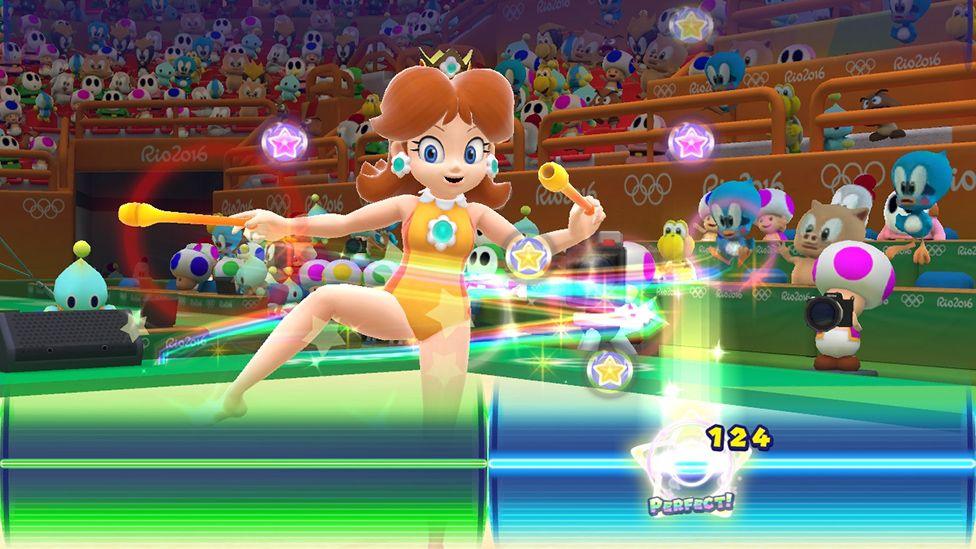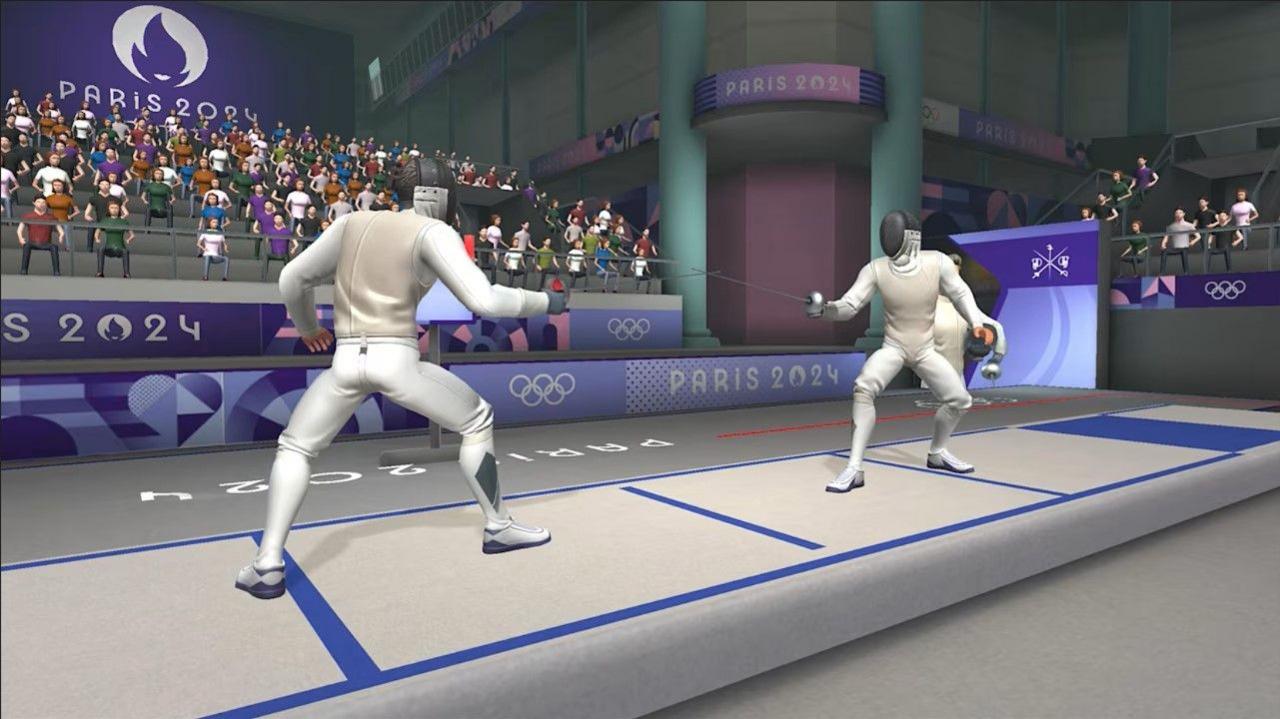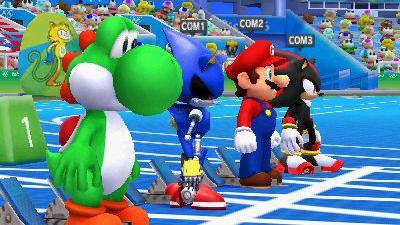Game over for Mario & Sonic at the Olympics?

You can't catch what you can't see: Mario and Sonic appearing in the same game would have been unthinkable at one point
- Published
Lavish opening ceremonies. Photo-finishes. Gold medal drama. All things we've come to expect during the Olympic Games.
But if you've wondered why two famous faces have been missing this time around, you're not alone.
You might even be one of the 300,000 people who saw Lee Cocker's post on X about them.
Mario and Sonic.
Since the Beijing Olympics, the former video game rivals have joined forces in a series of tie-in titles starring characters from both franchises.
The mascots have sprinted, jumped and thrown their way through a collection of summer and winter Olympic events every four years, and their most recent outing took them to their home country, Japan.
But the world's favourite plumber and Earth's fastest hedgehog haven't paid a visit to Paris in 2024.
Is it the end of an era? BBC Newsbeat tried to find out.
'It's that Olympic spirit'
Lee Cocker was an executive producer on the series for 17 years, and worked on every game from the 2008 edition to the Tokyo version.
He tells Newsbeat the idea of Mario and Sonic starring in a game together would have been unthinkable in the 1990s.
But by the early 2000s relationships between once-bitter enemies Nintendo and Sega had softened.
Lee says he presented a prototype of the game to bosses of both companies and the International Olympics Committee (IOC), and all of them were impressed.
The first game was a huge success, selling about 26 million copies, according to Lee.
"It was two of the most iconic video game characters coming together at the Olympics," he says.
"And it was on the Wii."
At the time, the Nintendo console with motion-control capabilities was a sensation, outselling rivals PlayStation 3 and Xbox 360.
It was also incredibly popular with families. So a game everyone could gather around the TV to play was an easy sell.
"It was a perfect storm," says Lee.

The Mario and Sonic games included various events to allow the developers to introduce different gameplay mechanics
While the sequels never quite matched the sales of the first game, they remained popular.
And when Lee posted on X to confirm that there would be no Paris version the response was huge.
"My Twitter blew up, my social media blew up, my emails blew up," he says.
"Loads of people messaging me, saying: 'We love that game. We grew up on that game'."
Despite this, Lee says the licence wasn't renewed for 2024, and the understanding was that the IOC wanted to work with a new partner.
"Think of it as a cake," he says.
"Everyone has to get a piece - the IOC, Nintendo, Sega - so if they're doing it with another company, they get a bigger percentage."
Lee says he had expected Ubisoft, the French gaming giant known for franchises including the family friendly Rayman and Rabbids series, to be chosen.

Paris 2024's tie-in game is a mobile title
In the end the IOC went for nWay, a developer with offices in San Francisco and South Korea.
They've produced a mobile game, Olympics Go!, which Lee says is "very good", but would have been produced on a much smaller budget.
Lee says the IOC also wanted to explore the use of NFTs - the short-lived crypto-powered token - and esports.
There's been criticism of the sports body for this, but Lee says it's understandable that it would want to reach new audiences by using emerging technologies.
But he admits he'd have been keen to explore what could have been with a Paris 2024 edition of Mario and Sonic.
"What I always liked about Mario and Sonic and working on it was introducing new sports," he says.
"Breakdancing is an Olympic sport this year.
"How good would it have been to see Mario and Sonic doing breakdancing? Bowser spinning on his shell or something?"

The series also appeared on handheld consoles such as the Nintendo DS
Another group of people upset by the lack of a new Mario and Sonic game are speedrunners - players who spend hours competing to log the best times in the games' different events.
Although the series was a fun family hit, speedrunning has a dedicated community built around it.
JH2000, who holds two world records in the Winter Olympics versions, says there's a surprising amount of depth to the titles.
"Each character has its own set of stats," he says.
"You've got your speed characters, the all-around characters, the technical characters and the power characters.
"And each one has their own feel in different events."
JH says the speedrun community was "gutted" when they learned Mario and Sonic wouldn't be heading for Paris.
"When we heard nothing about it we were completely and utterly gutted," he says.
"We just thought, 'we can't just end like this'.
"We heard nothing, so we just thought, OK, maybe it's coming out later, until we found out it wasn't."
'Dead reyt': The love letter to Yorkshire making gamers cry laughing
- Published3 August 2024
'Thank you to Toriyama for brightening my childhood'
- Published8 March 2024
Super Mario: Jack Black on rise of game adaptations
- Published5 April 2023
All hope might not be lost. When BBC Newsbeat asked the IOC for an explanation as to why there was no Paris version of Mario and Sonic, it blamed "tight timelines after the postponed Olympic Games Tokyo 2020".
"However the Tokyo edition is available and very popular. Watch this space for the future," they added.
Lee is less optimistic about the characters qualifying for another Olympics, but says the big thing for him is the legacy of the games he did get to make.
"These two videogame characters coming together for the Olympics, that's what happens, it's that Olympic spirit," he says.
"It was very, very iconic, and I'm glad that people shared that. It means a lot to them, and it was a big part of their childhood."
